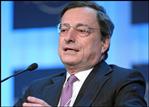
Eurozone policymakers chose to wait for more information on the impact of "Brexit", after euro area markets weathered the surprise event remarkably well, and the central bank stands ready to act on studying data in coming months, European Central Bank President Mario Draghi said Thursday.
The Governing Council will monitor economic and financial market developments very closely and aim to safeguard the pass-through of its accommodative monetary policy to the real economy, Draghi said in the introductory statement in his post-decision press conference in Frankfurt.
"Following the UK referendum on EU membership, our assessment is that euro area financial markets have weathered the spike in uncertainty and volatility with encouraging resilience," Draghi said.
The ECB left its key interest rates unchanged for a third straight session on Thursday.
In the June 23rd referendum, 52 percent Britons voted to leave the European Union in a surprise move. "Brexit" is expected to create a huge negative shock for the U.K. economy, and simultaneously slow the euro area recovery.
The readiness of central banks to provide liquidity, and the ECB's accommodative monetary policy measures, as well as a robust regulatory and supervisory framework, have all helped to keep market stress contained, Draghi noted.
Euro area financing conditions remain highly supportive, contributing to a strengthening in credit creation, and continue to support the baseline scenario of an ongoing economic recovery and an increase in inflation rates, he said.
"Over the coming months, when we have more information, including new staff projections, we will be in a better position to reassess the underlying macroeconomic conditions, the most likely paths of inflation and growth, and the distribution of risks around those paths," Draghi said in his introductory statement to the press conference.
"If warranted to achieve its objective, the Governing Council will act by using all the instruments available within its mandate."
The next ECB rate-setting session is on September 8, when policymakers will have the latest ECB staff macro economic projections.
The bank continues to expect the euro area economic recovery to proceed at a moderate pace, Draghi said, adding that the risks to the growth outlook remain tilted to the downside.
"Headwinds to the economic recovery in the euro area include the outcome of the UK referendum and other geopolitical uncertainties, subdued growth prospects in emerging markets, the necessary balance sheet adjustments in a number of sectors and a sluggish pace of implementation of structural reforms," he said.
Inflation is expected to remain low in the next few months and then pick up later this year, largely due to the base effects in energy price inflation. Inflation rates are expected to increase further in 2017 and 2018.
Draghi also stressed the importance of a well functioning bank lending channel in the backdrop of the prevailing uncertainties such as "Brexit".
He also reiterated the need for quicker implementation of structural reforms and formulation of fiscal policies that support economic recovery.
The ECB Chief also sought progress on capital markets union and reforms to improve resolution of non-performing loans to support investment and job creation.
by RTT Staff Writer
For comments and feedback: editorial@rttnews.com
Economic News
What parts of the world are seeing the best (and worst) economic performances lately? Click here to check out our Econ Scorecard and find out! See up-to-the-moment rankings for the best and worst performers in GDP, unemployment rate, inflation and much more.

